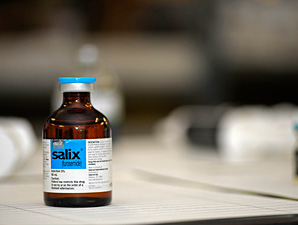Setback for Keeneland's Lasix-Free Race Plans


An opinion by outgoing Kentucky attorney general Jack Conway that the Kentucky Horse Racing Commission acted beyond its authority when it allowed state racetracks the ability to card furosemide-free races could hinder Keeneland's plans to conduct such races in 2016.
The Lexington oval had expressed interest in conducting races, beginning with its spring meet in 2016, that as part of the conditions would prohibit the race-day administration of furosemide (Salix, commonly referred to as Lasix).
In March the Kentucky Horse Racing Commission paved the way for Keeneland to offer such races when it updated rules to allow tracks to offer races that adhere to the International Medication Protocol (which prohibits race-day medication) as a condition of a particular race. On Dec. 18 Conway signed an opinion that the KHRC "may not delegate the authority to determine whether to have furosemide-free races to individual racetracks."
The opinion was requested by Marty Maline, executive director of the Kentucky Horsemen's Benevolent and Protective Association. The Kentucky HBPA opposed the KHRC's decision to allow Kentucky tracks to add race-day medication prohibitions into their race conditions.
"There are a limited number of opportunities for horsemen to run, especially at Keeneland," Maline said, referring to the Lexington track's short spring and fall meets that offer some of the highest purses in the country. "If a race is carded as Lasix-free, then that limits the opportunity to run for horsemen who believe Lasix is a therapeutic medication to prevent epistaxis in the horses. This is helping horses. Lasix on race day is allowed in Kentucky, and we feel this attorney general opinion endorses that regulation."
The opinion seems to allow tracks the ability to card such races with KHRC giving final approval of such events.
"Determination of whether a race is furosemide-free cannot be left solely to individual racetracks," the opinion offered. "Should KHRC wish to promote furosemide-free races, it may do so through an administrative framework which retains final approval of whether a race is furosemide-free with KHRC and specifies procedures for that approval."
Keeneland vice president of racing Rogers Beasley said track executives will meet after the holidays to assess the attorney general's opinion and what it means going forward.
Keeneland, which typically releases its condition book for April races in mid- to late-February, had planned to card some 2-year-old races at its spring and fall races as Lasix-free events.
On Dec. 23, KHRC staff also was gathering more information on the opinion and what it means going forward.
Maline said the Kentucky HBPA also was concerned because the regulation does not cap the number of races that could be offered as Lasix-free events.
"Theoretically, if a track runs 10 the first year, the next year they might run 20," Maline said. "It really has far-reaching effects, not just one or two races at Keeneland."
In the attorney general's opinion, it noted that an administrative regulation review subcommittee on Sept. 8 found the proposed regulations deficient but on Sept. 28 Gov. Steve Beshear promulgated the regulations "notwithstanding the subcommittee's finding of deficiency."
"In summary, we advise the KHRC may not delegate to private actors its authority to determine which regulations for the administration of drugs to horses apply to a particular race, as setting regulations for the administration of drugs to horses is a discretionary function committed by statute to KHRC," the opinion concludes.
